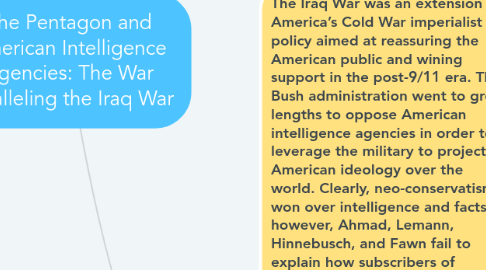
1. The Iraq War was an extension of America’s Cold War imperialist policy aimed at reassuring the American public and wining support in the post-9/11 era. The Bush administration went to great lengths to oppose American intelligence agencies in order to leverage the military to project American ideology over the world. Clearly, neo-conservatism won over intelligence and facts; however, Ahmad, Lemann, Hinnebusch, and Fawn fail to explain how subscribers of neo-conservative ideology gained a significant enough influence over the Bush administration to undermine the entire American defense intelligence system. An interesting gap in the research is how a group of neoconservatives managed to hijack Congress and public opinion to fight a parallel war against American intelligence agencies.
1.1. Suppression and politicization of American intelligence agencies:
1.1.1. Almost all opposition within the administration to the neoconservative cause was swiftly put down. Proponents of the war predicted the war would not cost over $50 to $60 billion dollars, and when Bush’s economic adviser Lawrence Lindsey gave a more realistic estimate of $200 billion, he was removed. This turned out to still be significantly lower than the true cost, which was over $2 trillion. Moreover, General Hugh Shelton, chairman of the Joint Chiefs of Staff, asserted the war would “undermine the fight against terrorism” and was promptly replaced.
1.2. Manipulation of public opinion through systematic infiltration of media with propaganda
1.2.1. Despite widespread opposition to the Iraq invasion from intelligence agencies, the neoconservatives prevailed. They helped manufacture the propaganda, amplified it in the media and ‘stovepiped’ it to decision makers. The invasion was sold as a ‘pre-emptive’ war to disarm Iraq, which, through the conjunction of its alleged weapons of mass destruction (WMDs) and terrorist ties, was presented as an imminent threat. The neoconservatives furnished both elements of the case presented on media.
1.3. Israeli financing of neo-conservative members of the Bush administration
1.3.1. The Israel lobby had a vast institutional network in the American government, including key neoconservative officials in the Bush administration. Without the lobby’s help, these officials would have struggled to secure key advisory positions that enabled them to influence top decision makers and neutralize dissenting intelligence agencies. The Israel lobby so Iraq invasion as a stepping stone to Tehran.

